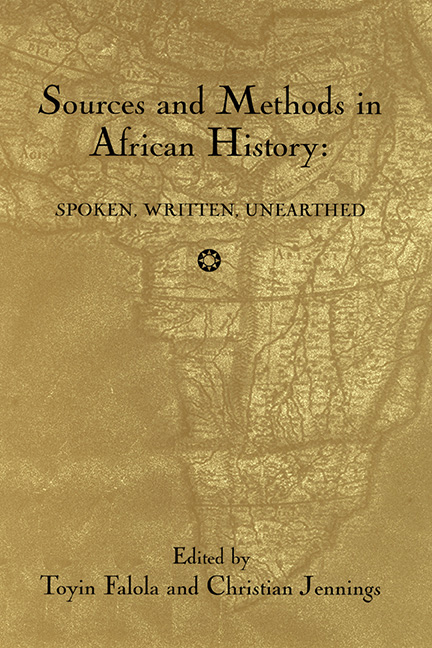Book contents
- Frontmatter
- Dedication
- Contents
- Acknowledgments
- Introduction
- Part I Archaeological Sources
- Part II Africa and the Atlantic World
- 6 Section Introduction: Methodology through the Ethnic Lens: The Study of Atlantic Africa
- 7 Pathways to African Ethnicity in the Americas: African National Associations in Cuba during Slavery
- 8 Slave Trade Nomenclature and African Ethnicities in the Americas: Evidence from Early Eighteenth-Century Costa Rica
- 9 Africa in Louisiana: In Search of “Bambara” and Creole Identities in Literary and Statistical Sources
- Part III Documentary Sources
- Part IV Oral Tradition
- Part V Innovative Sources and Methods
- Contributors
- Index
8 - Slave Trade Nomenclature and African Ethnicities in the Americas: Evidence from Early Eighteenth-Century Costa Rica
from Part II - Africa and the Atlantic World
Published online by Cambridge University Press: 25 October 2017
- Frontmatter
- Dedication
- Contents
- Acknowledgments
- Introduction
- Part I Archaeological Sources
- Part II Africa and the Atlantic World
- 6 Section Introduction: Methodology through the Ethnic Lens: The Study of Atlantic Africa
- 7 Pathways to African Ethnicity in the Americas: African National Associations in Cuba during Slavery
- 8 Slave Trade Nomenclature and African Ethnicities in the Americas: Evidence from Early Eighteenth-Century Costa Rica
- 9 Africa in Louisiana: In Search of “Bambara” and Creole Identities in Literary and Statistical Sources
- Part III Documentary Sources
- Part IV Oral Tradition
- Part V Innovative Sources and Methods
- Contributors
- Index
Summary
Historians of the African Diaspora have welcomed the recent publication of a database on the transatlantic slave trade with great excitement. Easily accessible data on more than 27,000 slaving voyages now make it possible to trace the Old World provenances of Africans in the New World with greater specificity than ever before; a far-reaching reassessment of the role of African identities in the Americas has been predicted. On the basis of some general findings of the Trans-Atlantic Slave Trade database, a “new orthodoxy” has emerged among certain Africanist historians, which sees slaves in the Americas “forming identifiable communities based on their ethnic or national pasts.” In his influential Africa and Africans in the Making of the Atlantic World, John K. Thornton has contended that European slavers drew “extremely homogeneous” human cargoes, usually from a single African port, and the slave trade “did little to break up cultural groupings.” Once on New World estates, “slaves tended to cluster around members of their own nation,” further reinforcing cultural similarities.
This paper draws on sources from Costa Rican archives as well as the new database to raise a methodological challenge to this “new orthodoxy.” By tracing the ethnic nomenclature—the casta names—attributed to the human cargoes of two Danish slave ships, from the time they embarked on the coast of West Africa through their enslavement in Costa Rica, I will show that much of the evidence that Africanists have used to make “ethnicbased” arguments suffers from an inherent unreliability. First, Spanish slavemasters generally categorized African slaves by their imputed port of embarkation. They sometimes made demonstrable mistakes in guessing the ports at which Africans embarked. Second, even when the names of the ports were correct, they did not necessarily bear any relationship to the ethnic identity of the slaves boarded there. Third, Spanish slavemasters often ethnically classified and reclassified the same African-born individuals several times in their lifetimes, casting strong doubts on the consistency or degree of accuracy with which they recorded African ethnic origins. Fourth and most important, when asked directly about their ethnic origins, slaves often volunteered a different name than that used by their masters.
- Type
- Chapter
- Information
- Sources and Methods in African HistorySpoken Written Unearthed, pp. 145 - 155Publisher: Boydell & BrewerPrint publication year: 2003



